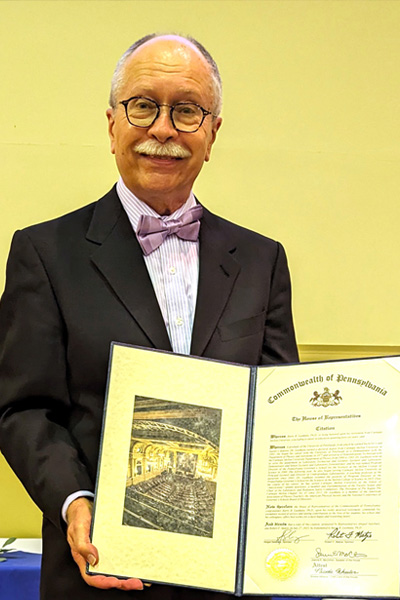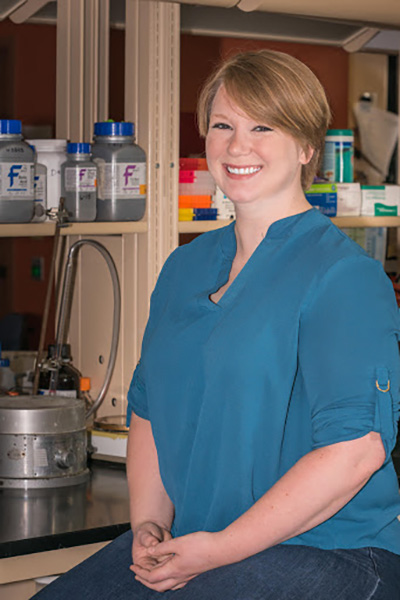Barry Luokkala Supported Generations of Scientists Through PGSS
The Pennsylvania Governor's School for the Sciences (PGSS) Program changed the lives of many students. The program also changed the life of Carnegie Mellon University Physics Professor Barry Luokkala, who recently retired as PGSS Program director.
"Barry invited thousands of students to be his colleagues in science," said Associate Teaching Professor of Biological Sciences Natalie McGuier, who is the new PGSS Program director. "He's synonymous with PGSS for a lot of people, and his legacy is being a true support for the students who completed the program and for creating an atmosphere of professional fun."
The PGSS Program is a summer enrichment program for rising high school seniors in the state of Pennsylvania. Hosted at Carnegie Mellon since its beginning in 1982, students spend five weeks studying college-level biology, chemistry, mathematics, computer science and physics. Classes are taught by area university faculty members.
"We have a lot of anecdotal information and testimony from alumni who were so passionate about the program. It has had a profound effect on the students who participate," Luokkala said.
Luokkala taught for the PGSS Program beginning in 1986 and in 2001, he became its director. The number of PGSS participants has fluctuated over the years, with 72 students in the 2023 experience. Some 3,000 high schools have participated in the past 40 years.
"Barry knows the program better than probably anyone alive," said Ben Campbell, professor of engineering at Robert Morris University. Campbell participated in the program as a high school student from Pine-Richland School District and returned as a teaching assistant/counselor during Luokkala's first years as a director. The experience inspired him to become an educator, and he has served as a PGSS faculty member many times.
After the program was canceled in 2009 because of state funding cuts, Campbell was among the PGSS alumni who worked to raise funds to support bringing the experience back in 2013.
"Without Barry's institutional knowledge and willingness to restart the program, it would have been difficult to restart PGSS with the same successful formula that has served it well for 40 years," Campbell said. "Barry is incredibly detail oriented and wise in the way that he manages the program, applying Vulcan-like logic and precision to governing PGSS consistently each year. He can be firm when needed but has a jovial side as well."
Heidi Malin is the executive director of the PGSS Campaign, the nonprofit that works to seek funding for the PGSS Program.
"Dr. Luokkala was always supportive of the campaign's fundraising efforts and was willing to help by writing letters for our annual alumni fundraising challenge or submitting grants on the Campaign's behalf," she said. "Each student attends the program free of charge; in essence, a $6,500 scholarship."
No high school or college credit is given for PGSS courses completed by the students. No grades are given, and students are not ranked academically against each other. Instead, faculty teach courses and provide research experiences that allow students academic freedom to pursue interest in sciences and mathematics beyond the classroom.
Alumni of the program have gone on to become scientists, professors, doctors, authors, software engineers and entrepreneurs.
DJ Kleinbaum, co-founder of Emerald Cloud Labs and a CMU alumnus with a bachelor's degree in biological sciences, participated in the PGSS Program in 2000 and serves as a mentor to graduates of the program considering their college options.
"It was frankly a transformative experience for me and one of the most important educational experiences I've had in school," Kleinbaum said. "The project I did in governor's school ended up being the same project I worked with as an undergraduate for three years at Carnegie Mellon."
During the COVID-19 pandemic, the program continued as a virtual education experience. Junior physics major Allison Weller participated in the 2020 virtual PGSS Program cohort.
"Working with other students, everyone was really driven, and it was a lot of fun just talking with them," she said. "Dr. Luokkala was very good and invested in running the program smoothly. He was so willing to help out people with their projects and make sure everything was able to get something valuable out of the experience."
Tripp Hoover was a junior at Bradford Area High School who was part of the 2021 virtual cohort. He got to know the other students and the instructors via Zoom.
"One of the things that really helped was that he had Zoom office hours, and all of the students could hop in and have a conversation with him," Hoover said of Luokkala. "It was a great chance to socialize and have fun. It's such a vital part of a program like that and to have such an outlet helped to boost everyone's mood. He was an amazing mentor and guide."
Hoover said the opportunities that the PGSS Program opened up were immense.
"I grew up so much as a person," said Hoover, now a sophomore in mathematical sciences at Carnegie Mellon. He served as a teaching assistant for PGSS in 2023. "My first semester at Carnegie Mellon, I had experimental physics with him. I was very nervous coming to college, but knowing one of my professors during my first semester was comforting during the transition."
At the end of the 2023 session, Luokkala passed the baton to McGuier. The PGSS Program is a family affair for her. Her husband and brothers-in-law all participated in the program, and she has worked with the program as an instructor since 2015.
"The people who get involved see the worth of the program pretty quickly," McGuier said. "We are taking the best and brightest in Pennsylvania. It is truly the best part of my year, and it reminds me why I love science so much."

